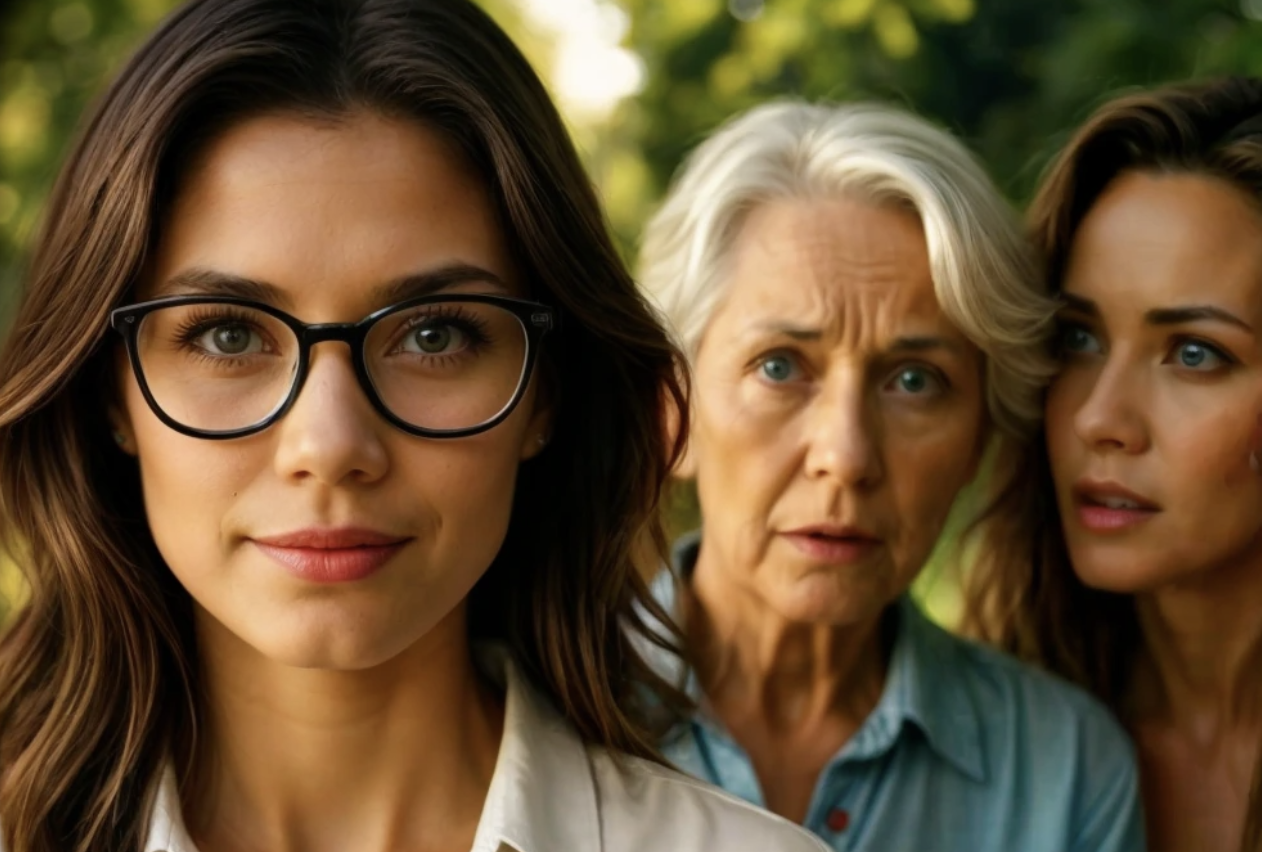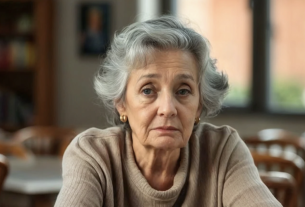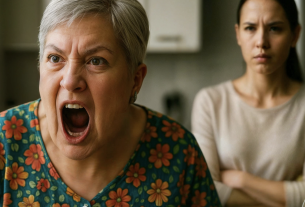When Sergey died in a car accident, Marina didn’t immediately realize what had happened. She got a call from the hospital telling her to come. Then there were blurry hours of waiting in the corridor, a doctor with downcast eyes, formalities that had to be observed.
And her son Kirill — a three-year-old boy who didn’t understand why his mother kept crying.
At the funeral, mother-in-law Valentina stood apart, surrounded by her husband’s relatives. No one came up to Marina to hug or support her. Only sideways glances and whispers behind her back.
“She never appreciated him,” Marina heard. “Sergey worked a lot, and she wasted all the money.”
Marina held Kirill in her arms and stared straight ahead. She didn’t have the strength to argue.
After the memorial, Valentina approached her for the first time that day.
“I want to talk to you,” she said, pursing her lips.
They sat in the kitchen of the apartment Marina rented with Sergey. The mother-in-law tapped her nails on the table without taking off her black gloves.
“I’m taking Sergey’s car,” she began without preamble. “It’s family property. And the summer house too.”
“What?” Marina lifted her head. “But we saved up for the car together. And the summer house…”
“Don’t interrupt!” Valentina cut her off. “I’ve thought it through. You’re young, beautiful, you’ll find another husband. But we need something to remember our son by.”
“What about Kirill? He’s your grandson.”
Valentina grimaced as if she’d heard something inappropriate.
“How do I know he’s even our grandson? You’ve always been frivolous.”
Marina gasped in outrage.
“How can you say that? Sergey was happy when Kirill was born! He was so glad his son looked like him!”
“Enough of this circus!” Valentina stood up. “I’ve said all I needed to. Have the documents for the car ready by the end of the week.”
A month later, Marina found out that her mother-in-law had registered not only the car but also Sergey’s insurance under her name. And also that her husband had taken out a loan before he died, which she didn’t know about. Now the bank was demanding money from her.
When she called Valentina, the answer was cold:
“That’s your problem. We’re no longer family. And don’t bother bringing the grandson — we have our own life.”
That evening, Marina sat on the floor of the rented apartment she would soon have to vacate — she had no money to pay. Kirill was sleeping in his crib, once a gift from Sergey. Could he have imagined his family would turn their backs on them?
“Why are they doing this?” Marina whispered into the emptiness. “What did I do to them?”
In the morning she woke up with eyes swollen from crying and a firm decision. She would no longer cry. She would manage — for Kirill’s sake. For herself.
Five years flew by like one long day filled with work, study, and caring for her son.
Marina remembered how in the first month after Sergey’s relatives rejected her, she had to wake up at five in the morning to take Kirill to a retired neighbor, then rush to her first job — cleaning at a supermarket, work in the afternoons putting up posters, and night shifts at a 24-hour pharmacy.
“Mommy, you fell asleep with the book again,” Kirill tugged her shoulder one night when she’d nodded off over her accounting textbook.
“Sorry, honey,” Marina rubbed her eyes. “Mom just got a little tired.”
“I drew this for you,” Kirill handed her a sheet of paper. “This is you — the most beautiful and smartest mom in the world.”
She hugged her son tightly, feeling tears well up again — but this time they were tears of gratitude. Moments like these made the struggle worthwhile.
When Kirill started school, Marina was already working as an assistant accountant in a small company. The boss, Tamara Nikolaevna, saw potential in her.
“You’ve got a good head on your shoulders,” she told Marina. “And a strong character. Not everyone could handle raising a child alone.”
“I’m not handling it,” Marina sighed. “I’m just doing what I can.”
“That’s exactly what handling it means,” smiled Tamara Nikolaevna.
At parent-teacher meetings, Kirill’s teachers praised him — talented, attentive, polite. Marina listened, unable to believe her happiness. Her boy was growing into a real person despite all hardships.
“Marina Andreyevna, you should consider signing Kirill up for math olympiads,” suggested the homeroom teacher after second grade. “He clearly has talent.”
“Is that expensive?” Marina immediately asked, calculating her budget as usual.
“For you — free,” smiled the teacher. “It’s a city program supporting gifted children.”
Life was gradually getting better. By the fifth anniversary of Sergey’s death, Marina was a senior accountant, had rented a small but cozy apartment, and even saved some money for the summer. Kirill had won the city math olympiad and was preparing for the regional one.
“Mom, will Grandma Valya come to my competition?” he sometimes asked.
“I don’t know, sweetheart,” Marina answered honestly. “She’s very busy.”
“Why doesn’t Grandma ever call?”
“Adults sometimes make mistakes,” Marina carefully chose her words. “But that doesn’t mean they don’t love you.”
“Do I look like Dad?” Kirill persisted. “You said so.”
“Very much so,” Marina kissed the top of his head. “In looks and character. Just as persistent and fair.”
On the day of the city fair celebrating the town’s anniversary, Kirill was to receive a certificate for his olympiad victory. A stage was set up in the city square, parents, teachers, and officials gathered.
“Mom, I’m nervous,” Kirill admitted, squeezing her hand.
“It will be fine,” Marina adjusted his shirt collar. “Just smile and say ‘thank you.’”
She didn’t immediately notice them. Valentina stood aside with Sergey’s sister — Kira. They were talking about something, occasionally glancing around.
Marina froze. She hadn’t seen these people in five years. Five years managing without their help, without their involvement in Kirill’s life.
“Kirill Sergeyevich Voronov!” the announcer called from the stage. “Winner of the city math olympiad among younger students!”
Kirill confidently climbed the steps, shook hands with the mayor, and accepted the certificate amid applause. Marina couldn’t hold back a smile. Her son — so small, yet so serious on stage. Her heart overflowed with pride.
“I want to thank my mom,” Kirill suddenly said into the microphone. “She’s the best. She works, studies, and always finds time to help me with my problems.”
There were touched murmurs in the crowd. Marina pressed her hands to her cheeks, feeling flushed with embarrassment and joy. Out of the corner of her eye, she noticed Valentina and Kira standing frozen, staring at the scene.
When the ceremony ended, Kirill ran off the stage and threw himself at his mother.
“Did you see? I didn’t forget my speech!” he exclaimed.
“You were amazing,” Marina hugged her son. “A real champion.”
“Marina?” a familiar voice called behind her.
She slowly straightened and turned. Valentina stood before her. Older, with a new haircut. But the same cold look. Kira shifted nervously beside her.
“Hello, Valentina Petrovna.”
“So this is Kirill?” the mother-in-law glanced at the boy. “He’s grown up. Just like Sergey.”
Kirill looked cautiously at the unfamiliar woman, pressing closer to his mother.
“Yes, he’s eight,” Marina replied, placing her hand on her son’s shoulder.
“Kirushka, don’t you remember me?” Valentina bent down to the boy. “I’m your grandmother. Your dad’s mother.”
Kirill looked at her seriously and said with surprising straightforwardness:
“Mom says my grandmother is very busy. So she never comes.”
Valentina straightened, throwing a quick glance at Marina.
“We… we really were busy,” she stumbled. “But now we want to make up. Right, Kira?”
Kira nodded with forced enthusiasm:
“Of course! We’re so glad to have found you. Kirill, you’re so clever! A real smart boy!”
“Thank you,” the boy replied politely.
“Marina, you look great,” Kira continued. “You haven’t changed at all.”
That was a lie. Marina knew she had changed — become stronger, more confident. There was a firmness in her eyes that only comes after real trials.
“Where do you live now?” Valentina asked, looking Marina over from head to toe, noting her neat suit and shoes.
“In the Western district,” Marina answered shortly.
“In new buildings?” Kira was surprised. “Those apartments are so expensive.”
“We rent,” Marina cut in. “But it’s enough for us.”
An awkward pause hung. Valentina was clearly gathering her thoughts, nervously fiddling with her purse strap.
“Maybe…” she finally began, “maybe you could come to us this weekend? Kirill could look at his father’s photos. I have plenty left.”
Marina felt her insides clench. Five years. Five years they hadn’t cared whether Kirill had a roof over his head, food to eat, or clothes to wear. Five years they hadn’t asked how he was growing, what illnesses he had, what he dreamed about.
“Mom, can I go to Denis’s?” Kirill suddenly asked, pointing at a classmate nearby. “He wanted to show me his new astronomy book.”
“Of course, dear,” Marina smiled at her son. “Just don’t go too far.”
When Kirill ran off, she turned to the former relatives.
“Why now?” she asked quietly.
“What do you mean, ‘why’?” Valentina was indignant. “He’s our grandson, Sergey’s blood.”
“Five years ago you even doubted that,” Marina pursed her lips. “What changed?”
“People change,” Kira said. “Mom often thinks about you. We didn’t know how to find you.”
“We live in the same city,” Marina smirked. “Not another country.”
Valentina pursed her lips. The look of injured pride appeared on her face — the one Marina knew by heart.
“You always held your nose up,” she muttered. “You could have called yourself, told us how the grandson was growing.”
Marina took a deep breath. Inside she boiled, but she tried not to break.
“After you said we were no longer family? After you took the car, insurance, and didn’t even ask if we had food?”
“I lost my son! I went crazy!” Valentina’s voice trembled. “You have to understand me!”
“I lost my husband too,” Marina said quietly. “And Kirill lost his father. But you abandoned us when we needed you most.”
Kira shifted nervously. She clearly felt out of place.
“Marish, let’s leave the past in the past,” she forced a smile. “The main thing now is we want to make peace.”
“Why now?” Marina looked her straight in the eyes.
Valentina and Kira exchanged quick glances. Something flickered in their eyes that made Marina’s insides tighten.
“We saw Kirill on stage,” Valentina finally said. “Such a smart boy, just like Sergey. And you… you look good. You must work at a decent place.”
“I’m an accountant,” Marina replied bluntly.
“See!” Kira brightened. “Your life’s better now. We could help with Kirill. Pick him up from school when you’re at work. Take him on weekends.”
“I manage myself,” Marina answered firmly. “We’re fine.”
“But a child needs a family!” Valentina threw up her hands. “Grandma, aunt… A man nearby, finally!”
“Didn’t he need that five years ago?” Marina felt anger rise inside her — the anger she’d suppressed for so long.
“Marina, enough already,” Kira grimaced. “Mom admits she freaked out then. We were all on edge. Sergey, after his father left, became the only man in the family. His departure destroyed us.”
“Me too,” Marina straightened. “But I was able to get up and move on. For my son.”
Kirill came running up, out of breath, holding a book.
“Mom, look! Denis gave me a star atlas! He says it has all the constellations we can see!”
“Wow!” Marina smiled.
“Kirusha,” Valentina interjected, “do you want to visit Grandma? I have an album with photos of your dad. And his childhood toys are here.”
Kirill looked curiously at the woman but then glanced at his mother as if asking what to do.
“Kirill, this is your grandmother Valya and aunt Kira,” Marina said softly. “You decide if you want to be friends with them or not.”
“Why didn’t you come before?” the boy asked directly. “When we lived in a bad apartment and mom worked all the time?”
Valentina turned pale, Kira stared at the ground.
“Adults sometimes do stupid things, Kirushenka,” Valentina muttered. “But we want to fix everything.”
“Okay,” Kirill nodded seriously. “I’ll think about it.”
Marina looked at her son with tenderness. At eight, he already knew how to think for himself and wasn’t afraid to speak the truth.
“Kirill, go to your friends,” she said. “I’ll call you when it’s time to go home.”
When the boy ran off, Marina turned to the former relatives.
“I won’t forbid Kirill from seeing you if he wants to,” she said firmly. “But don’t think you can just come back into our lives as if nothing happened. And don’t you dare use him to control me.”
“Who cares about you!” Valentina flared up. “We want to communicate with our grandson! It’s our right!”
“Right?” Marina smiled bitterly. “Rights don’t exist without duties. And you abandoned your duties five years ago.”
She noticed one of the teachers walking toward them.
“Marina Andreyevna!” the woman called out. “The school principal wants to see you. To discuss the regional olympiad for Kirill.”
“I’m coming, Anna Sergeyevna,” Marina replied and threw Valentina and Kira a look: “Sorry, we’re expected.”
“You always thought only of yourself!” Valentina blurted out. “Selfish!”
“No,” Marina answered calmly. “I think about my son. About what he needs.”
She turned and walked away. Their eyes burned into her back. The old wound inside still ached, but today it was a little healed. Marina endured. She managed. And no one would make her pity herself anymore.
“Kirill!” she called. “The principal is waiting for us!”
The boy ran up, grabbed her hand, and they walked together toward the school delegation — mother and son, a small but strong family who had been through hell and come out stronger.



